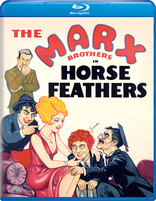Horse Feathers Blu-ray Movie
HomeHorse Feathers Blu-ray Movie 
Universal Studios | 1932 | 67 min | Not rated | Nov 07, 2023Movie rating
7.4 | / 10 |
Blu-ray rating
| Users | 0.0 | |
| Reviewer | 4.0 | |
| Overall | 4.0 |
Overview
Horse Feathers (1932)
Quincy Adams Wagstaff, the new president of Huxley U, hires bumblers Baravelli and Pinky to help his school win the big football game against rival Darwin U.
Starring: The Marx Brothers, Groucho Marx, Harpo Marx, Chico Marx, Zeppo MarxDirector: Norman Z. McLeod
| Romance | Uncertain |
| Comedy | Uncertain |
| Musical | Uncertain |
Specifications
Video
Video codec: MPEG-4 AVC
Video resolution: 1080p
Aspect ratio: 1.33:1
Original aspect ratio: 1.37:1
Audio
English: DTS-HD Master Audio 2.0
Subtitles
English SDH, French
Discs
Blu-ray Disc
Single disc (1 BD)
Playback
Region A (B, C untested)
Review
Rating summary
| Movie | 4.5 | |
| Video | 3.5 | |
| Audio | 3.5 | |
| Extras | 1.0 | |
| Overall | 4.0 |
Horse Feathers Blu-ray Movie Review
Reviewed by Jeffrey Kauffman October 16, 2016Note: This film is available as part of The Marx Brothers Silver Screen Collection.
The Marx Brothers remain one of the most iconic comedy teams in the entire history of show business, including of course their film work. Years of
vaudeville experience and then Broadway stardom meant the siblings came to cinema with personas largely set and with a huge “catalog” of bits they
could utilize for their film work. That said, the movie going public had never really seen anything like the manic proclivities of this familial troupe, and
countless commentators from 1929 (when The Cocoanuts debuted on celluloid) on have attempted to analyze various elements of the
team’s completely unique comedy. While perhaps not especially “meaningful” in any overarching way, I had an unusual response to watching these
new transfers of the first five Marx Brothers feature films (all reportedly sourced from new 4K restorations done by Universal), one probably sparked
by my recent reviewing duties.
Arrow Video’s UK branch recently released
Woody Allen: Six Films 1971-1978, and in doing some background reading in preparation for my reviews of the movies in that set,
more than once I read in various articles comments along the lines of “Allen helped to define Jewish humor” or “Jewish humor simply wouldn’t be
the
same without Allen.” Allen’s patented brand of neurosis, sexual obsession and verbal acuity may indeed be at least a trifecta of Jewish
humor if not the trifecta, but one only need look a bit further back in time to the Marx Brothers for another potent example of the
“mainstreaming” of elements that could well be considered Jewish humor. I'm not suggesting this is the only way to look at the Marx Brothers'
efforts, or even that it's an "important" way, just that it struck me as "being there" for me after having just watched a bunch of Allen films.
In a way, though, the Marx Brothers’ perceived “Jewishness” is a little
more subliminal than Allen’s is in his own films, though for those with the eyes to see, the siblings represent their generation of Jews rather
iconically.
Not only is their verbal humor full of puns and other formalistic hijinks, the very subject matter of many of their jokes tends to focus on social,
political and even economic elements. The very fact that the act is comprised of family is important, with a “me and you against the world”
ambience
that speaks to outcasts (obviously including Jews) to this day. But there’s a “subtext” to many of the early Marx Brothers films, where the
brothers
are the outsiders, virtual interlopers attempting to make sense of a calamitous “new” world, whether that be a hotel, high society, a passenger
ship,
college sports or even a supposed nation in the throes of financial ruin.
What’s fascinating about the early Marx Brothers efforts is how they very
subtly display signs of the assimilative fervor that many first or second generation Jews of that time period experienced, where it became
paramount
(no pun intended, considering the studio which released the early Marx Brothers efforts) to “blend in”. That may seem positively non-intuitive,
given
the Marx Brothers’ predilection toward anarchic behavior and just outright silliness, but when seen through the prism of an early to mid 20th
century
“Jewish identity,” the first five Marx Brothers feature films offer not just laughs galore, but a rather interesting example of so-called “ethnics”
rather
brilliantly invading the American consciousness in an almost subversive way. In this respect, the Marx Brothers become one of the most potent
examples
of what might be termed cultural immigration, where their Jewishness may have been slightly cloaked but no less ingratiating in the long run.
That
“cloaking” may be nowhere more obvious than in the persona of Chico, a Marx who spoke with a faux Italian accent and who seemed to be
something of a grifter at times. Cloaked in another way but perhaps arguably more ostensibly Jewish, at least on one interpretive level, was Harpo,
the weirdly childlike mute who seemed
to
often be the hapless scapegoat in many of the films, the outsider whose very powerlessness (as evidenced by his inability or unwillingness to
speak)
created “problems,” albeit often in a comedic way. The most obvious paradigm of Jewishness is of course Groucho, with his hyperarticulate
verbal
humor and a probably more than slightly lecherous mien which may in fact be a precursor for some of Woody Allen’s more sexually charged
material.
Zeppo, the kind of “forgotten” Marx Brother, and the one whose film persona is probably the blandest, may therefore somewhat ironically be seen as
the best symbol of those
aforementioned assimilative tendences—Zeppo had “learned” how to be an American first, blending in as the troupe’s straight man and therefore
almost seeming like an outsider himself, at least within the insular world of the siblings’ relationships.
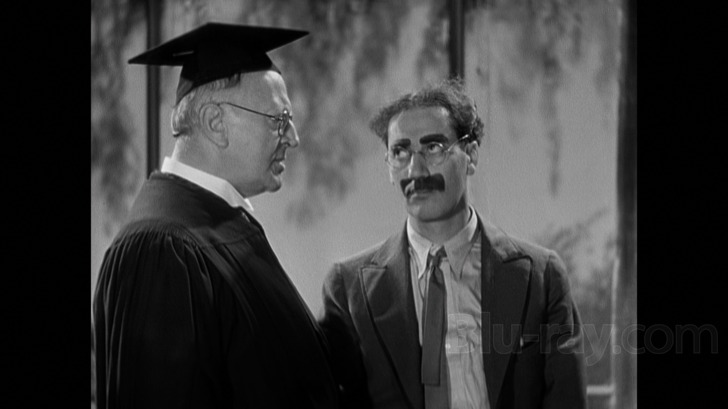
You might be excused for thinking that Horse Feathers would revolve around, well, horses, but, no, that’s the later Marx Brothers effort A Day at the Races (to be fair, horses do show up a couple of times in this film). Horse Feathers actually skewers higher education and specifically the world of college football. Groucho portrays Professor Quincy Adams Wagstaff, a not exactly scholarly type who has been hired (some might allege illogically) to rescue Huxley College, an academic establishment teetering on the edge of extinction. Wagstaff employs his son Frank (Zeppo Marx) to help beef up the college’s football team (with professional players), in the hopes that that might help turn around the college’s fortunes.
Of course, Wagstaff’s plans soon go completely haywire, and two unlikely suspects, Baravelli (Chico Marx) and Pinky (Harpo Marx), end up as students and football players. Meanwhile, Frank is pining after pretty Connie Bailey (Thelma Todd). Horse Feathers is in some ways the most dated of the Marx Brothers’ Paramount outings, at least in terms of its subtext about Prohibition and elements like a Speakeasy. But the film is often ingeniously hilarious, including the justly famous final scene which sees Harpo “invading” a football field in what amounts to a Marx Brothers version of the chariot race from Ben-Hur.
While this is still an ostensible ensemble comedy, there's little doubt that Groucho assumes a more important central role in Horse Feathers, and some might see this film as the moment when he tended to subsume his brothers as the "star" Marx. Still, Chico and Harpo at least have their moments in the sun, even if Zeppo is kind of shunted off to the sidelines, as often tended to be the case.
Horse Feathers Blu-ray Movie, Video Quality 
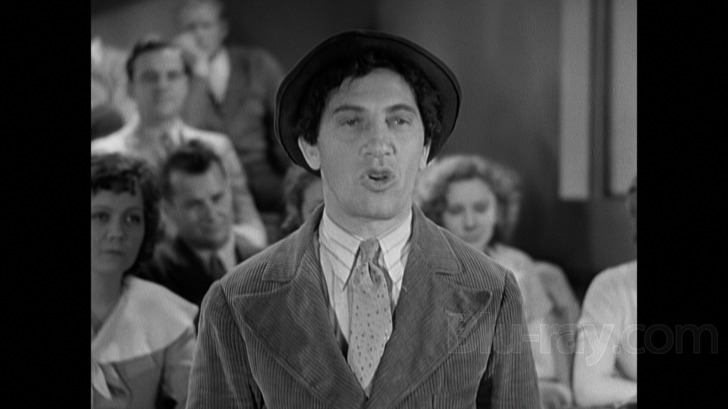
Horse Feathers is presented on Blu-ray courtesy of Universal Films with an AVC encoded 1080p transfer in 1.33:1. This transfer has manifestly fewer age related dings than are apparent in Monkey Business (though there are still minor ones), but it's unfortunately beset by some odd vertical wobble and warping anomalies that show up on several occasions. This transfer also has the tendency for slightly odd looking grain structures at times, with quasi-parallel lines running vertically through the image. One notable example is at circa 33:00, where the combination of grain and scratches creates an almost crosshatched appearance. There's noticeable vertical wobble with occasional attendant warping at several moments, including circa 19:34, and then a longer stretch beginning at around 45:44 which continues through the boat scene with Groucho reprising "Everyone Say I Love You". During the worst moments, the image is pretty unstable looking. While there's variable clarity throughout, when things aren't beset by the aforementioned issues they can look very good, with deep blacks, excellent contrast and generally commendable detail levels, along with good sharpness and clarity.
Horse Feathers Blu-ray Movie, Audio Quality 
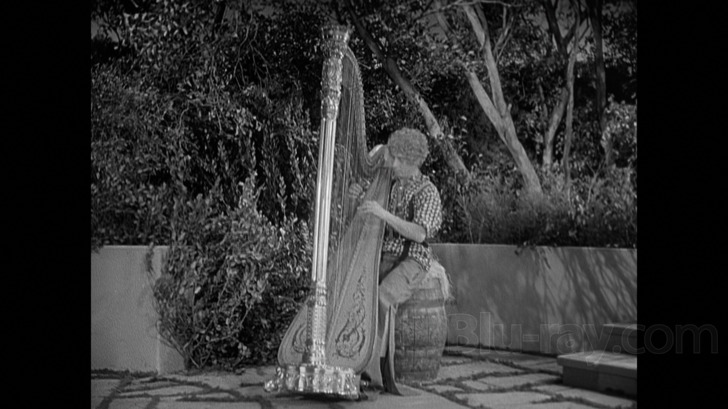
Horse Feathers' DTS-HD Master Audio 2.0 mono track has the typically boxy sound of its era, but as with Monkey Business, there's an actually quite full sounding midrange which helps to support both the music and dialogue. There's a bit of brittleness in the upper ranges at times that can sound slightly distorted (especially in musical elements), but nothing that struck me as overly problematic.
Horse Feathers Blu-ray Movie, Special Features and Extras 
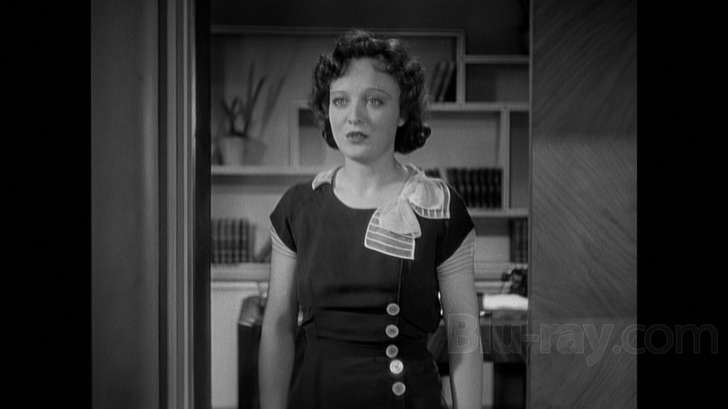
- Feature Commentary with Film Critic F.X. Sweeney. Sweeney gets into quite a bit of interesting material, dealing how then recent news events like the Lindbergh baby kidnapping played into various plot dynamics (or not, as the case may be). He also details some of the sometimes contentious relationship between S.J. Perelman and at least some of the brothers.
Horse Feathers Blu-ray Movie, Overall Score and Recommendation 
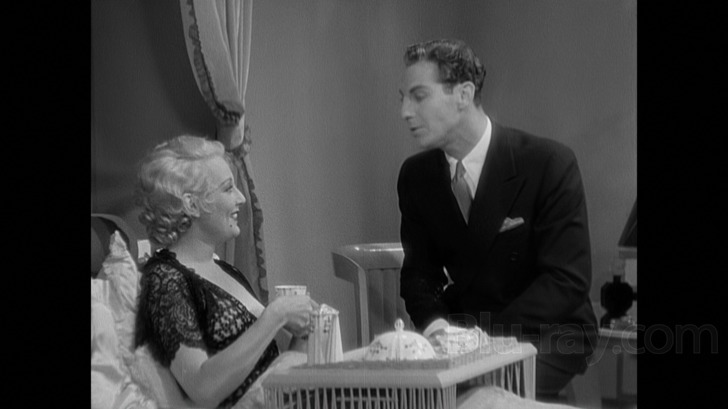
College sports is such a "skewable" subject that Horse Feathers perhaps retains more of its immediacy than some of the earlier Marx Brothers films, based as they are on such now "antique" subjects as Florida's land boom (this even admitting the "quaintness" of the Prohibition bits). The film contains some of the brothers' best bits and tells a relatively more coherent story than some of the other Marx outings, which is not to say this is exactly a course in rational thinking processes. There are some video issues with this transfer, but otherwise Horse Feathers comes Highly recommended.
Similar titles
Similar titles you might also like

Animal Crackers
1930

Monkey Business
1931

The Cocoanuts
1929

Duck Soup
1933

College
1927

The Freshman
1925

The Circus
1969 Rerelease Version
1928

The Gang's All Here
Limited Edition to 3000
1943

Good News
Warner Archive Collection
1947

Swing Time
1936

Luv
1967

A New Leaf 4K
Standard Edition
1971

I'm No Angel
1933

A Countess from Hong Kong
1967

Smiles of a Summer Night
Sommarnattens leende
1955

Cluny Brown
1946

The Lady Eve
1941

Sherlock Jr.
1924

O.C. and Stiggs
Limited Edition
1985

Design for Living
1933
